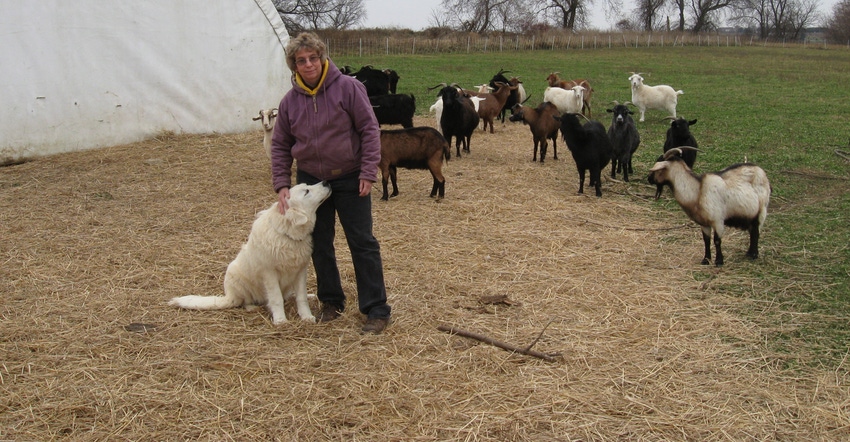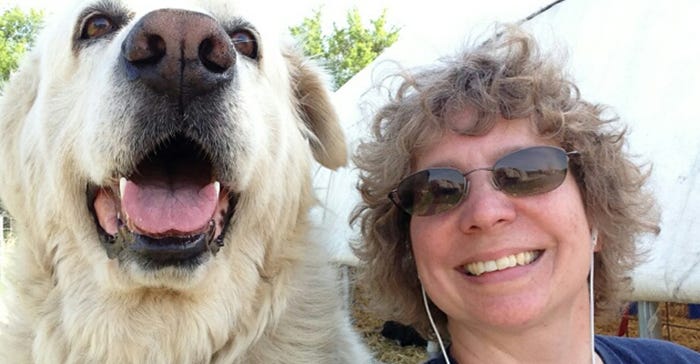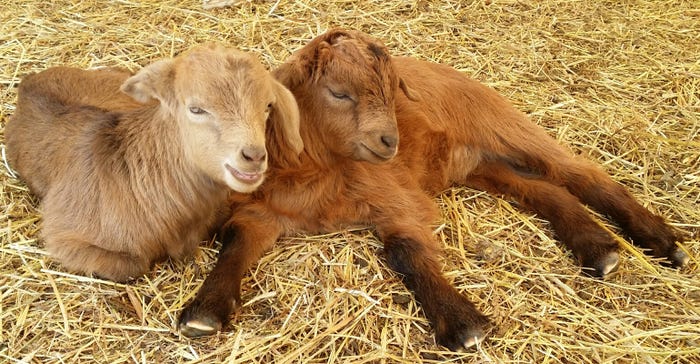January 6, 2017

There's a lot of energy within chemist Dawn Becher. She holds a doctorate and heads a research and development lab for a Menasha plastics company. She also runs a small farm an hour away near Campbellsport, and spends some of her weekends at farmers markets and fiber shows.
"In my spare time — which isn't much — I farm," she says, laughing. But Becher says she finds farming as challenging and rewarding as her day job.
"It was just a calling," she goes on. "I felt God was calling me to simplify my life. I like a simple life."
Yet farming would seem to complicate it. Becher's energy, for instance, shows up at 4 a.m. daily when she's up to tend her flocks — two breeds of goats, two of geese, assorted laying hens, plus a half dozen dogs to guard against rats and a significant coyote problem in her neighborhood. Then she's off to her lab, putting in a full day and returning to farm chores again. In summer, she also has berry crops to tend.
Becher's boyfriend, her brother and his girlfriend all help on the farm. But most of the responsibilities fall on Becher, 52, who heard her calling to farm only about 10 years ago.
A Chicago native, she grew up in Pewaukee and has early memories of visiting relatives on Wisconsin dairy farms. She began raising a few cashmere goats on a small farm at Random Lake and moved to Campbellsport when her current 44-acre farm became available. Now, she looks after 50-plus cashmere and fainting goats, a sizable flock of Chinese geese plus a few Sebastopols, a few chickens, and her Maremma sheepdogs.
Becher sells goat and Maremma breeding stock, cashmere fiber, eggs, and berries from an acre of several blueberry varieties, plus seaberries and honeyberries. She doesn't butcher or knit, but "I'm trying to experiment with different fruits and berries," she says, "trying to find a niche market."
She's been working with several different varieties of blueberries for seven or eight years, finding that "some work well, others not at all." She favors heritage breeds and varieties. The seaberries originate in Siberia and the honeyberries in Russia. Like blueberries, they are healthful. "If we can find natural ways to eat," Becher says, "that mitigates what we eat that we shouldn't."
She is amazed that young people growing up do not know where their food is coming from. Becher sells fruit and eggs at farmers markets and fiber shows but does the bulk of her business on her Narrow Gate Farms website, narrowgatefarms.com.
Self-taught farmer
Becher is a resourceful, largely self-taught farmer but credits a neighboring organic dairy farmer as her mentor.
"He would help me not be stupid," she says, laughing. "'Yeah, no,' [he says], 'I don't think you wanna do that.'" So she's learning as she goes. She learned to irrigate her berries and pay close attention to soil pH because blueberries like acidic soil. She learned to freeze cashmere fiber for a few days after harvesting — her first combings (fiber is combed, not shorn from cashmere goats) were devoured by moths.
When she began raising berries, she had to weed, so she went to "weeder geese." "I bought seven Chinese geese ... turned them into the berry field, and they weeded and weeded," she says. But as the geese grew bigger in their second year, they started weeding the bushes, too. "So now they [older geese] can't be in the berries anymore."
The geese have the run of the rest of the farm. Chickens are also free-range. And along with the goats, all are under the watchful eyes of her protector dogs. "I can't say enough for the [Maremma] breed," Becher says. "They really protect our herd from coyotes. I've had geese taken right out of the driveway. That's why I started breeding these dogs." The breed originated in Italy.
One of her dogs, a wise female, had a distinctive bark to tell when a doe was giving birth so Becher didn't have to sleep in the barn to attend the birth.
"She would clean the kids — an unbelievable dog," Becher recalls. That dog died recently, but a replacement is in training.

OLD FRIEND: Becher spent a lot of time with her dog Emma, a Maremma who recently died. Emma had a distinctive bark that alerted Becher when nannies were giving birth.

The fainting goats are marketed mainly as pets, and the cashmeres as fiber producers.
"Most of my time goes into breeding stock," she says. She is breeding for a red cashmere factor, a more desirable color, but explains that breeding for the soft fiber is an inexact science.
"This is my second year, and I've got some very good red stock," she says, but notes that "the quality of stock is not necessarily carried on to the next generation. You can breed black and red and get white. I mean, come on!" For a while, Becher was the only cashmere breeder in Wisconsin until she began selling breeding stock.

SEEING RED: Becher is breeding her cashmere goats for a red factor.

One of her cashmere females was pictured in a Wisconsin Lottery television commercial. "They rented Bebe for the commercial," she explains.
Right now, she acknowledges, she's farming more than as a hobby, but not enough — at least, not yet — for a living. She's aiming to change that sometime in the future.
"Little by little," she says, "I'd like to do more farming. But the learning curve is so large. You learn so many things. ... Farming is harder than any job I've ever had in chemistry. You have to know everything."
Buchholz lives in Fond du Lac.
About the Author(s)
You May Also Like




